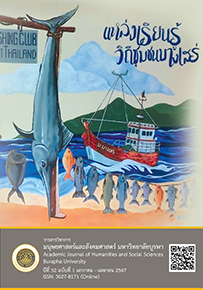The Contemporary Strategies for Social Inquiry
Main Article Content
Abstract
Aristotle developed the strategy of using reason to refer to facts in the formal form of knowledge creation in ancient Greece. It became the precursor to the later development of strategies.
Although Aristotle’s deductive reasoning strategy has long dominated the methods of knowledge acquisition and continues to the present day. In the 17th century, Francis Bacon pointed out that the deductive reasoning method has the weakness that it is unrealistic and does not seek new knowledge. Therefore, the inductive reasoning method is proposed.
At the beginning of the 20th century, Charles Sanders Peirce criticized the traditional method of reasoning for its weaknesses in that it overlooked specific facts. Deductive methods excluded information inconsistent with the premise and removed it from the analysis. The inductive method eliminates data that is inconsistent with the pattern of generalization. He proposed using abductive reasoning, which was later developed into a retroductive method.
The fact-based reasoning of each strategy has both its weaknesses and strengths. Suppose the strengths of one approach are used to complement the shortcomings of the other strategy. In that case, it may lead to much new knowledge and theories under rapidly changing and emerging social phenomena.
Downloads
Article Details

This work is licensed under a Creative Commons Attribution-NonCommercial-NoDerivatives 4.0 International License.
บทความทุกบทความเป็นลิขสิทธิ์ของวารสารวิชาการมนุษยศาสตร์และสังคมศาสตร์ มหาวิทยาลัยบูรพาเท่านั้น
References
ราชบัณฑิตยสถาน. (2557). พจนานุกรมศัพท์สังคมวิทยา (พิมพ์ครั้งที่ 4). อรุณการพิมพ์.
อนุสรณ์ ลิ่มมณี และวรวลัญช์ โรจนพล. (2563). ปรัชญาและวิธีการแสวงหาความรู้ทางรัฐศาสตร์และสังคมศาสตร์. ใน ระเบียบวิธีวิจัยทางรัฐศาสตร์ เล่ม 1 (พิมพ์ครั้งที่ 2). สำนักพิมพ์มหาวิทยาลัยสุโขทัยธรรมาธิราช
Aliseda, A. (2006). Abductive reasoning: Logical investigations into discovery and explanations. Springer.
Bellucci, F., & Pietarinen, A. (2015). Charles Sanders Peirce: Logic. Internet Encyclopedia of Philosophy. https://iep.utm.edu/peir-log
Blaikie, N. (2010). Designing social research: The logic of anticipation (2nd ed.). Polity Press.
Blaikie, N. (2011). Approaches to social enquiry: Advancing knowledge (2nd ed.). Polity Press.
Butts, R. E. (1993). Whewell’s logic of induction. In Historical Pragmatics: Philosophical Essays; Boston Studies in the Philosophy of Science, vol 155. Springer. https://doi.org/10.1007/978-94-015-8188-2_10
Davies, M., & Coltheart, M. (2020). A Peircean pathway from surprising facts to new beliefs. Transactions of the Charles S. Peirce Society: A Quarterly Journal in American Philosophy, 56(3), 400–426. https://doi.org/10.2979/trancharpeirsoc.56.3.05
Finn, V. K. (2011). J. S. Mill’s inductive methods in artificial intelligence systems. Part I. Scientific and Technical Information Processing, 38(6), 385–402. https://doi.org/10.3103/S0147688211060037
Fischer, H. R. (2001). Abductive reasoning as a way of worldmaking. Foundations of Science, 6, 361-368. https://doi.org/10.1023/A:1011671106610
Giese, D., & Schnapp, K. - U. (2021). D. Deductive, inductive, and retroductive reasoning. Politics Trove. In Research Methods in the Social Sciences: An A-Z of key concepts. Oxford University Press. https://doi.org/10.1093/hepl/9780198850298.003.0019
Grigore, C. (2016). Logical reasoning in humanitarian analysis. https://www.acaps.org/sites/acaps/files/resources/files/acaps_technical_brief_logical_reasoning_in_humanitarian_analysis_april_2016.pdf
Ebert, T. (2015). What is a perfect syllogism in Aristotelian Syllogistic?. Ancient Philosophy, 35 (2), 351-374. https://philarchive.org/archive/EBEWIA
Herschel, J. F. W. (2010). A preliminary discourse on the study of natural philosophy. University of Chicago Press.
Jary, D., & Jary, J. (1995). Collins dictionary of sociology (2nd ed.). HaperCollins.
Kenny, A. (2007). Philosophy in the modern world. Oxford University Press.
Kulicki, P. (2020). Aristotle’s syllogistic as a deductive system. Axioms, 9(2), 1-16.
Mukumbang, F. C. (2023). Retroductive theorizing: A contribution of critical realism to mixed methods research. Journal of Mixed Methods Research, 17(1), 93-114. https://doi.org/10.1177/15586898211049847
Meyer, S. B., & Lunnay, B. (2013). The application of abductive and retroductive inference for the design and analysis of theory-driven sociological research. Sociological Research Online. 18(1), 86-96. https://doi.org/10.5153/sro.2819
Summers, J. D. (2005). Reasoning in engineering design. In Proceedings of the ASME 2005 International Design Engineering Technical Conferences and Computers and Information in Engineering Conference. Volume 5a: 17th International Conference on Design Theory and Methodology (pp. 329-340). ASME. https://doi.org/10.1115/DETC2005-85334
Patzig, G. (1968). What is an Aristotelian Syllogism?. In Aristotle’s Theory of the Syllogism. (Synthese Library, vol 16; pp. 1-15). Springer. https://doi.org/10.1007/978-94-017-0787-9_1
Psillos, S., & Stergiou, C. (2022). The problem of induction. https://iep.utm.edu/problem-of-induction/#H8
Uchii, S. (2006). Herschel-Mill’s theory of induction. http://www1.kcn.ne.jp/~h-uchii/Holmes/holmes_4.html
Walton, D. (2005). Abductive reasoning. The University of Alabama Press.
Worboys, M. (2012). Africa as a living laboratory: Empire, development, and the problem of scientific knowledge, pp. 1870–1950, [Book review by Tilley, H.]. Isis, 103(2), 421–423. https://doi.org/10.1086/667509


